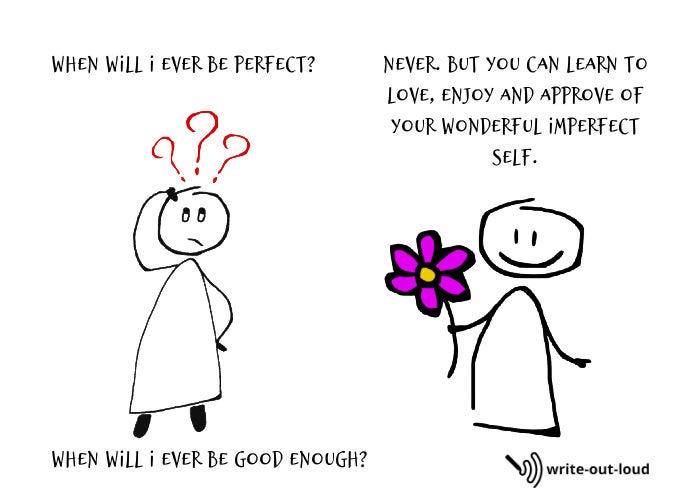Will I ever be good enough?
How wanting to be perfect causes perfection paralysis, and how to counter it.
There's aspiring to be the best you can be and then there's, perfection paralysis. They're close cousins - separated by a very thin line. Step over it and you'll find yourself trapped, stuck in ready-set... Wait!
I need to rehearse just once more.
I need to check that this top looks OK on me. Maybe this one is better.
I need to revise the order of the slides. Again.
Ready-set-whoa is a long way from ready-set-go and keeps getting longer each time we stop to fix this, that, and then something else.
Desiring to be perfect is fine but not if it becomes a straight-jacket: one stopping us from actually doing what we intend to. Then the quest for perfection is actually a mask for something else with another name. It's called avoidance and its root is fear.
This slant on perfection is one I am on nodding terms with. That's a positive change because once upon a time we were very close. I wore the jacket and squirmed inside its restrictions. Finally, I learned to see and call it for what it was.
There are endless perfection paralysis variations. These were common for me:
Reviewing notes for the umpteenth time in one day.
Replacing that sentence for this, with no discernible gain.
Saying key words one way, then that way.
All of them appeared as an understandable drive to be the best I could be. However, I knew they originated from anxiety about being good enough.
Am I good enough to stand in front of you?
Am I good enough to have you think I have something of value to say?
Am I good enough? Full stop. (As the British say). Or period. (As folk in the US say.)
Here are two things I’ve discovered about the 'good enough' question.
One is, it can never be answered by anybody else other than yourself. No matter how many times people give you the big-two-thumbs-up-vote-of-approval, if you don't give it to yourself the doubt remains.
The second is people don't want you to be perfect. They want you to be you; real, authentic. Yes, they want you to have genuinely prepared to the best of your ability but more? No.
Too good to be true is just that. It's well-oiled. It's slick. Even robotic. The human qualities have been air brushed out. What's left is a mechanical performance with no room for genuine connection or spontaneity. An audience on the receiving end of that feels 'done to'. They are witnesses rather than participants and they'll feel your desire for perfection as a wall - a deliberate separation. They may even start looking for the cracks.
If you're investing too much time on a perfection quest, you'll know it. Ask yourself why and listen for, and to, the answer.
Getting it right all of the time is impossible. We are human. We make mistakes. Ultimately what's important is not that we make them, but what and how we learn from them.
All you can truly ask of yourself is to be the best you can be. Anything else is futile.
Here's three quotations as reminders. Print, then pin where you'll see them.
“A man would do nothing if he waited until he could do it so well that no one could find fault.”
- John Henry Newman
“Striving for excellence motivates you; striving for perfection is demoralizing.”
- Harriet Braiker
“Done is better than perfect.”
- Mr Anonymous
PS. If you’re caught in a perfection cycle and would like a hand to break free of its round-and-round-and-round some more nonsense, have a look at these suggestions I put together for managing public speaking anxiety. You may just what you need there to help.
That’s it for this week.
Until next time,
Stay well. Stay strong.
Susan
PPS. If you found this useful, feel free to share it and click the ❤️ button so more people can discover it on Substack. 🙏Thank you.




Great read, Susan.
I recently came across something similar, two questions (is this good? does this suck?) from comic book writer Lynda Barry.
“‘The Two Questions’ came from trying to write something good and not getting very far because I had forgotten that trying to write something good before I write anything at all is like refusing to give birth unless you know for sure it is going to be a very good baby.”
http://thegreatcomicbookheroes.blogspot.com/2013/12/lynda-barrys-two-questions.html
Grreat advice! Ooops - I made a mistake. Oooh no! Why did I submit that?! What can I do? Why didn't I check my comment over 5 more times?? Or maybe 10. Reword that 2-word sentence better! Maybe re-take typing lessons so I don't make those keyboard errors! Aaargh!! ;-)